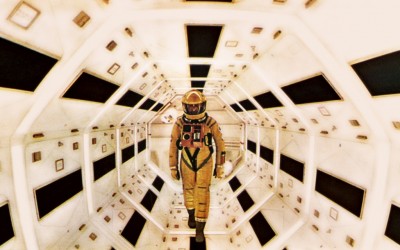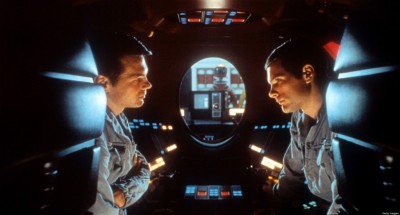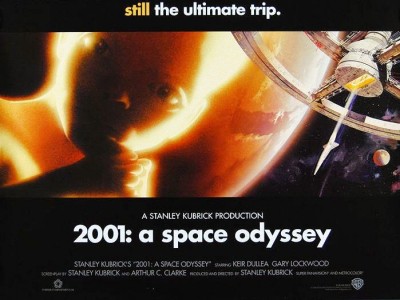
When I say it took me 42 years to like Stanley Kubrick’s 2001: A Space Odssey (1968), I’m not kidding. I saw the film when it first came out and didn’t like it. I was 13 at the time and too young to “get it.” It didn’t help that my then best friend’s older brother, who considered himself an authority on all things science fiction, went along with us and insisted on explaining it all. (Nothing is more galling to a 13-year-old than having a pompous 14-year-old trying to set him right.) But I could never quite get away from the film in my own mind. I was sure that there was more to the film than I was processing. After years or reading up on the film, I tackled it again — and the best I could get out of these dissertations was a sense of “if you say so,” which is to say I wasn’t seeing it myself.

But I kept trying — about every five years I’d watch it again and the results were always the same. Then a few years ago something happened. That something had no direct relation to 2001 and it’s hard to explain clearly (which may be in keeping with Kubrick’s film). It had to do with finally seeing Ken Russell’s banned TV film Dance of the Seven Veils (1970) — a work that also used Richard Strauss’ composition Also Sprach Zarathustra. The way that this film used the music to convey a sense of regeneration and transcendence caused something to click, though I didn’t realize it until I saw 2001 again. Suddenly, all the things I’d read — and more — about the film fell into place on an emotional level. I’d gone from vaguely understanding what I’d read and heard to actually feeling it — and a movie that had seemed cold and distant to me became a deeply moving, even exhilarating experience.

Yes, I’m well aware that the preceding anecdote about my personal experience with 2001 is largely irrelevant as film criticism — at least on the surface. But really there’s nothing new that I can bring to the table in terms of criticism of the film apart from my attempts at “getting it” and having it finally happen. So much ink has been spilled over 2001 that it seems to me that there’s not much left to said about its technical brilliance or its meanings — and possible meanings. What I do think is overlooked, though, is that the film is ultimately less an intellectual exercise than it is an emotional one. It’s less about understanding it than it is about feeling it. That, I think, is partly why Kubrick made it so impenetrable. I also think it’s that Kubrick himself didn’t quite know how to say what he wanted to say and as a result, his film attains a strange kind of tongue-tied eloquence. My advice — apart from suggesting that you see it on the big screen, which is the only way to go with this — is to give yourself over to 2001 and feel the experience rather than think it. It’s the only way to travel.
The Asheville Film Society’s Big Screen Budget Series will show 2001: A Space Odyssey Wed., July 17 at 7:30 p.m. in one of the downstairs theaters at The Carolina Asheville. Admission is $5 for AFS members and $7 for the general public.




When I say it took me 42 years to like Stanley Kubrick’s 2001: A Space Odssey (1968), I’m not kidding.
So I’ve only got thirty-two years to go until I can enjoy this? Or if I see the Russell telemovie can I speed that process up?
I take it we should not be expecting you next week?
Sorry, my canoe’s in the shop.
Swim.
And don’t stop for snacks.
Sorry, my canoe’s in the shop.
I have one you can borrow.
Oh wait. That doesn’t work.
Are you still expecting this to sell out fairly quickly? I won’t be able to make it –anyways, I’m not scheduled to try and like this film again until next year– but I know of a couple of people that aren’t sensible enough to keep up with local movie news on their own, but would nonetheless leap at this opportunity.
It’s a pity you aren’t so scheduled because I’d bet that seeing it on The Big Screen is your best chance at liking it. As for it selling out…hard to say. I know its pre-sales were higher than usual last week. Justin would know more than I do.
And about that canoe…I’m not altogether certain I believe that Young Jeremy would know what to do with a canoe.
I remember thinking, when I saw that famous journey into the monolith sequence for the first time, that the film had finally hit the point where its reach had exceeded its grasp. The only way to payoff everything that came before was for the audience to be literally transformed into Star Children themselves by the film.
Ever hear of wigged-out composer Alexander Scriabin’s “Mysterium?” His idea for this 24 hour extravaganza (it was never finished) was that by the end both the musicians and the audience would have achieved nirvana. Perhaps this is Kubrick’s “Mysterium.”
I first saw this in 1969 in 16mm at the base theater at Camp Tien Sha in Danang, RVN. It was over 100 degrees in the theater but I stayed anyhow after my buddies left. In the context of the time it was head and shoulders above most scifi of that era. I loved every second of it even as impenetrable as the ending sequence is. The effects were extremely impressive at the time. I saw it again at the Cinerama Dome a few tears later and still liked it. However I think that most of the hype about it’s “meaning” is overblown. It did help to read Clarke’s book. Then the ending made some sense.
I still have a soft spot for it though I know that for most people it is crashingly dull. By all measures it should bore me to death, but it doesn’t. That’s life.
“I think that most of the hype about it’s “meaning” is overblown. It did help to read Clarke’s book.”
True. BUT…
Clarke wrote the book concurrently with the film (the short story “The Sentinel” did precede the film, but did not proceed beyond the moon-monolith scene), so instead of the film being an adaptation of the book with its’ own nuances, the book appears to be an adaption of the film which attempts to explain the film’s nuances after the fact, as presumably most people would read the book after seeing the film.
I would posit that the film and its’ screenplay would have existed even if Clarke had not written the book, so some of the mystery of intent or “meaning” within the screenplay remains, independent of Clarke’s interpretation.
Looked at last night — very probably the last time I’ll ever see it on the big screen — I have to say that the effects seem no less effective to me now than they did in 1968. And if it bored a packed theater — including a lot of first-time viewers (which surprised me) — last night, there was no evidence of it.
It achieves that which so many films attempt — and almost invariably fail at. It is an event.
I have to say that the effects seem no less effective to me now than they did in 1968.
I found them more impressive, crisp, and realistic than those in the GRAVITY trailer, and I’m no Cuar
I’m certainly no Cuaron hater either, but that trailer does not excite me. I don’t know that it’s actually possible to be bored in 2 1/2 minutes, but that trailer achieves something like it.
I don’t know that it’s actually possible to be bored in 2 1/2 minutes, but that trailer achieves something like it.
Sandra Bullock in a drama immediately raises the boredom potential.
No, that’s not bothering me. I liked her just fine in both that Ya Ya Sisterhood thing and Infamous. I think it’s that I can’t imagine where this can go.
Apollo 13 with fewer characters and no space shuttle?
Yeah, well, that’s sure enticing. (Rolls eyes.)